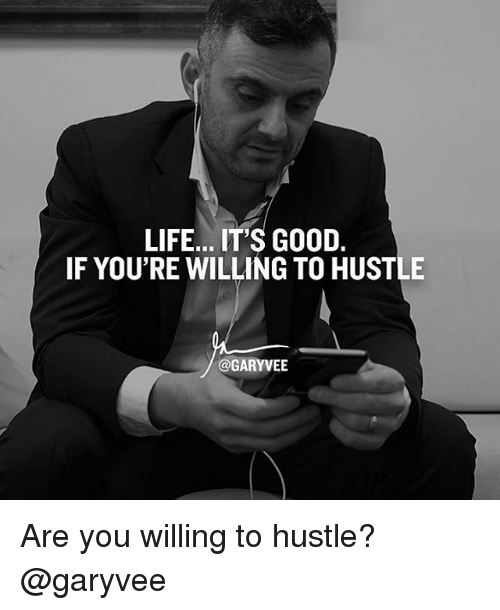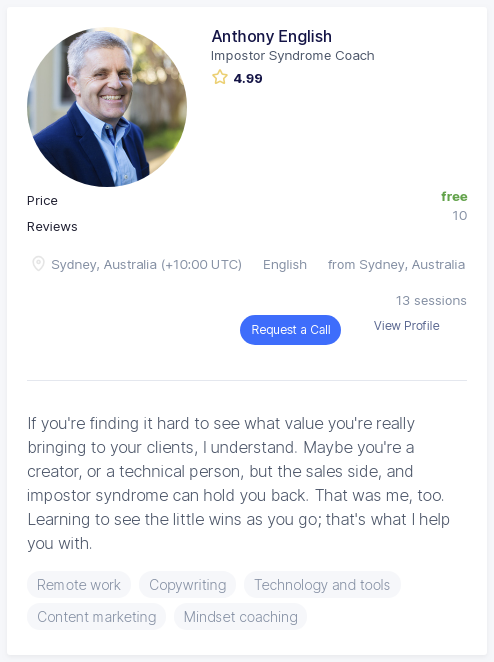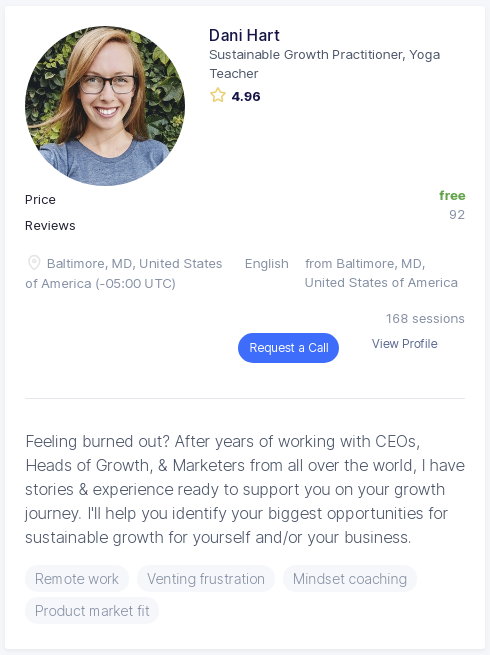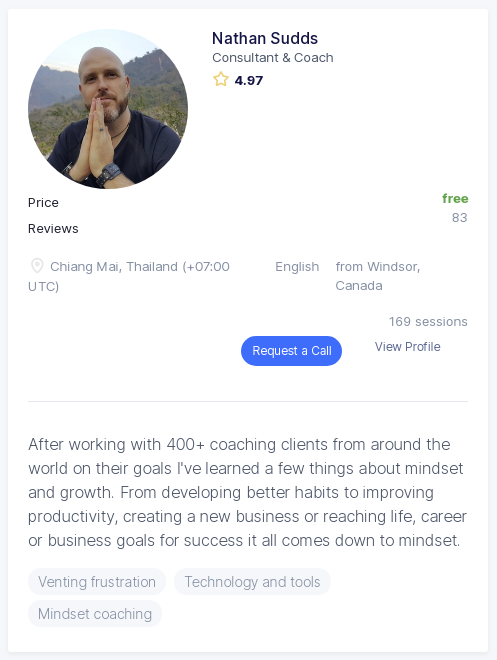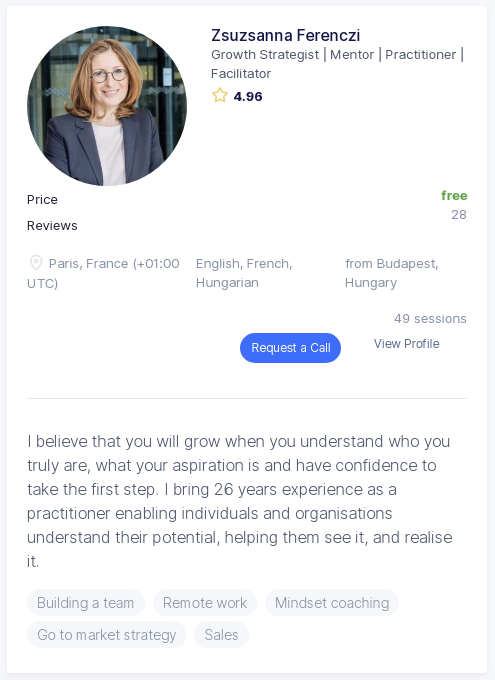How to Deal with Imposter Syndrome as a Startup Founder
Imposter syndrome is a real phenomenon, and it can affect anyone.
- Novelists can feel imposter syndrome when they’re starting work on a new book.
- Musicians can feel imposter syndrome when their band sells out a venue.
- Artists can feel imposter syndrome when wealthy patrons pay megabucks for one of their paintings.
- And startup founders can feel imposter syndrome when they’re pitching to investors or accepting awards at industry ceremonies.
Research shows that 20% of SME owners suffer from it, with 45% of those believing that someone else could do a better job of running their business.
So how do you manage imposter syndrome as a startup founder?
Let’s jump on in and take a look.
The Common Pitfalls
1. Listening to friends and family
Don’t get me wrong, I’m not saying that you should ignore everything that your loved ones tell you. At the same time, though, they can’t live your life for you.
One of the biggest problems that new founders face is that their friends and family members often think that they’re just fooling around with a new hobby. For some people, this can be a good thing because it pushes them to prove people wrong. For others, it can hold them back and make them start to doubt themselves.
Even when they’re well-meaning and when they take you seriously, they can end up providing you with advice that you’re better off ignoring. For example, your parents might think that they know what they’re talking about when they give you tax advice, but you’d be better off working with a professional accountant.
2. Feeling like you don’t know enough
Solo founder? Feel like a fraud? You’re not the only one.
It’s only natural for founders to worry that they don’t know as much as they need to know to get their job done, especially today when they need a wider range of skills than ever before. Back in the day, entrepreneurs could get away with having a single subject matter specialism and then broadening their knowledge in a few other key areas like accounting and human resources. Nowadays, entrepreneurs feel they need to know everything.
The good news is that the way we work (and learn) has changed.
There’s no need to know who the 32nd US president was when you can just Google it (it was Franklin D. Roosevelt, by the way). So rather than worrying that you don’t know enough, it can help to flip the question on its head and to focus on what you do know. You can learn everything else along the way – or just hire someone to do it for you.
3. Being afraid that investors won’t take you seriously
This is another entirely natural worry to have.
When you’re looking for investors, you’re asking people to give you their money, and people like to do their research before they part with their hard-earned cash, even when they’re well off. That’s why banks do background checks on people when they apply for loans and mortgages.
It’s similar to the natural doubts that people have ahead of job interviews, weddings and other high impact life events. The difference with entrepreneurs is that they’re not just asking investors to invest in them – they’re also asking them to invest in their idea, their team and their technologies.
That leaves a lot of room for doubt.
4. Hustling and taking on every job
One of the biggest issues in the entrepreneurial world today is the myth of hustle.
The “gurus” are obsessed with peddling the idea of working every hour of every day and they’ll tell their followers that they need to make huge personal sacrifices if they ever hope to get anything done.
Working hard is important, but falling victim to the myth of hustle is how you’ll end up burning yourself out, pushing friends and family away from you and demolish your health.
Think of it as the difference between sprinting and running a marathon.
Hustle can help you to meet a deadline or two during peak periods, but it’s no way for you to live your life.
As a founder, it can be tempting to try to take on every task yourself in the belief that you’re the only person who can be trusted to do it.
The problem is this isn’t scalable, and so if you establish this as your default behavior you’re going to struggle to keep growing your business unless you’re somehow able to clone yourself.
The Solution
The important thing to remember is that while all of these feelings are valid, they can be kept under control.
Knowing how to deal with imposter syndrome can come down to equipping yourself with the tools you need to deal with it.
There are a few different ways to approach this, I’ve listed a few of the best below.
1. Practice affirmations
There’s a reason why so many people swear by practicing affirmations: they work.
Even if it’s just the psychological equivalent of the placebo effect, practicing and believing in affirmations can have a positive effect on the way that you look at the world and the impact that your actions have.
It’s like the phrase that you see plastered across memes and inspirational Pinterest boards: whether you think you can or you can’t, you’re right.
Getting started with positive affirmations is pretty easy. Start by taking the negative thought or feeling that you’re having and then turn it on its head.
For example, if you’re worried that no investor will take you seriously, tell yourself that they will take you seriously and start to list out all of the reasons why.
You’re looking for evidence that dispels your negative thoughts and backs up the positive ones.
2. Find yourself a mentor
Perhaps I’m a little biased here because I’ve seen the power of mentorship first hand, but the point here is to tackle the assumption that you need to handle everything yourself.
If you’re fortunate enough to find a decent mentor, you’ll be able to ask them for their advice and learn from their mistakes instead of making costly mistakes of your own.
Working at GrowthMentor, I’m constantly surrounded by stories of people who’ve been able to use mentorship to take their business to the next level.
Just one example is Jacob Elbaum, a growth marketer at Voice123 who explained:

Jacob Elbaum- Growth Marketer at Voice123I’ve been using GrowthMentor for about eight months. I’ve met with 17 different people amongst many different channels and strategic levels of marketing. I’d say at least 90% of my sessions have led me to making decisions which have had an impact on my business.
Another great example of mentorship in action comes via entrepreneur and investor Itay Forer, who explained:

Itay Forer - Founder, Entrepreneur, Mentor & Advisor. YC alumniMy mentor explained the ins and outs of entrepreneurship and helped me to identify my blind spots around building a business ahead of time. He also helped me to map out potential future challenges like transferring responsibilities to others, building and modelling a culture of accountability and adapting to a changing market that I didn’t even know existed.
3. Hire some help
Freelance workers and the gig economy have changed the game for entrepreneurs, making it easier than ever before for them to hire extra employees to lend a helping hand. As opposed to traditional employment, in which you’d have to either work with expensive agencies or hire someone for a prolonged period of time, the gig economy means you can take people on to handle specific tasks and at a low price.
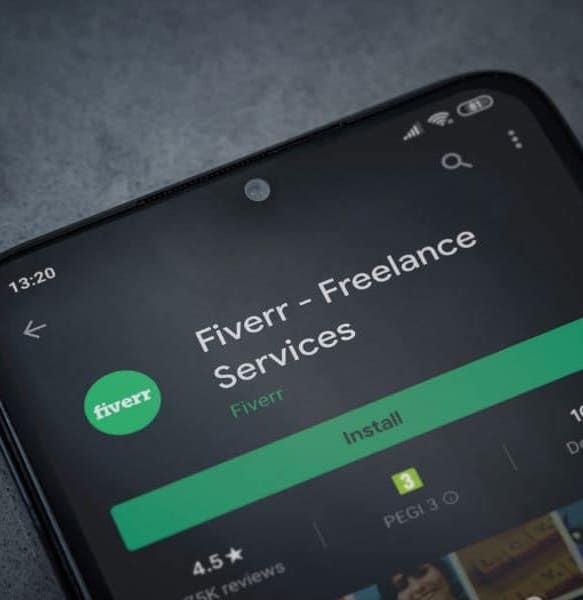
This relates back to the last point about mentors because you can get the two of them to work in tandem. In other words, you can take strategic and operational advice from your mentors and then turn to the gig economy to ensure that the tasks are carried out.
4. Listen to your gut
This is perhaps the most controversial piece of advice in this article because it’s now officially accepted best practice to place a huge amount of emphasis on monitoring metrics and using them to inform our business strategies.
Telling people to listen to their gut can seem comparable to when Luke Skywalker turned his navigation computer off and relied on the force during his attack on the Death Star.
But then, that worked out pretty well for him.
Learning to rely on your gut might not be useful when it comes to digital marketing and A/B testing, which are inherently more measurable, but it can come in useful when you’re taking on imposter syndrome.
In your heart of hearts (or your gut of guts), you’ll know whether you really are in too deep or whether it’s just a temporary blip on your journey towards success. If your gut’s telling you that you’re not quite ready to talk to investors, perhaps you should spend some more time preparing. And if it tells you that you probably do know enough to build your business, it’s a sign that you’re overthinking things and holding yourself back with your own self-doubt.
Parting Advice – Don’t go it alone
The truth is that there’s no easy answer to the question, “What makes a good startup founder?”
It requires a whole heap of different skills, but perhaps the most important of them is the ability to take on imposter syndrome and to come out on top of it.
It’s only natural to have doubts, in the same way that it’s only natural to feel sad from time to time. But there’s a difference between occasional sadness and clinical depression, just like there’s a difference between occasionally doubting yourself and being overwhelmed by imposter syndrome.
The tips that we’ve shared today should help you with that, but if you’re still struggling then it’s a good idea to find yourself a mentor – and if you can’t find a mentor, an accountability buddy is better than nothing.
As we’ve discussed, one of the biggest challenges that founders face is the fact that they often feel as though they have to tackle everything on their own. If you only take one lesson away with you today, make it this: you don’t have to do that.
Going it alone is will lead to burning yourself out and will doom your business to failure. It doesn’t matter what your business goals are, whether you plan to stay with the company until your retirement or whether you’re looking to sell up as quickly as possible. The company needs to be able to survive without you.
So don’t be afraid to accept a helping hand, and don’t allow that to further feed your imposter syndrome by thinking it makes you a failure if you ask for help. As the poet John Donne famously said, “No man is an island.”
Don’t fall victim to the hype of the solo founder. Get some help.
Here are a few recommendations:
Anthony English
Dani Hart
Nathan Sudds
Zsuzsanna Ferenczi
Conclusion
It’s only natural for you to feel doubt from time to time, and what really matters is how you deal with it. Will you allow it to hold you back, or will you persevere and push through it?
The good news is that taking on adversity and overcoming it will make your victory all the sweeter. And I’m not just saying that, either. I’m writing from personal experience as someone who’s faced imposter syndrome throughout his own career.
Still struggling to tackle imposter syndrome? Perhaps it’s time for you to get some help. Sign up to GrowthMentor to arrange one-on-one video calls with startup mentors who can help you to face your problems and overcome them. Good luck!


